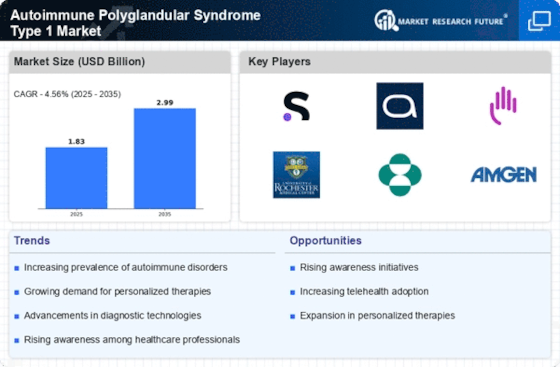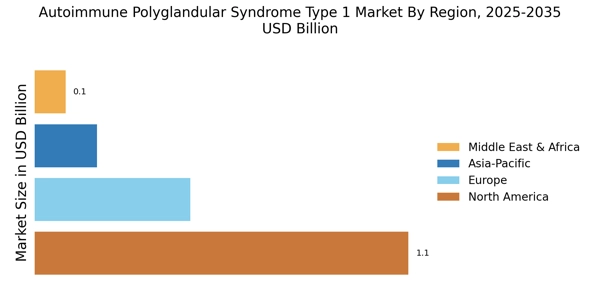Enhanced Diagnostic Techniques
Advancements in diagnostic technologies are playing a crucial role in the Autoimmune Polyglandular Syndrome Type 1 Market. The development of more sensitive and specific diagnostic tests, such as autoantibody assays and genetic testing, has improved the accuracy of diagnosing this syndrome. As a result, healthcare professionals are better equipped to identify Autoimmune Polyglandular Syndrome Type 1 Market in patients, which may lead to earlier intervention and treatment. The market for diagnostic tools is projected to grow, driven by the increasing need for precise and timely diagnosis of autoimmune conditions, thereby enhancing the overall management of Autoimmune Polyglandular Syndrome Type 1 Market.
Rising Demand for Personalized Medicine
The trend towards personalized medicine is becoming increasingly relevant in the Autoimmune Polyglandular Syndrome Type 1 Market. Patients are seeking tailored treatment plans that consider their unique genetic and environmental factors. This shift is prompting healthcare providers to adopt more individualized approaches to treatment, which may enhance the efficacy of therapies for Autoimmune Polyglandular Syndrome Type 1 Market. As a result, pharmaceutical companies are likely to invest in the development of personalized therapies, which could lead to improved patient adherence and outcomes. The growing emphasis on personalized medicine is expected to drive market expansion as patients and providers alike recognize the benefits of customized treatment strategies.
Increased Awareness and Education Initiatives
Awareness and education initiatives regarding autoimmune disorders are gaining momentum, which is likely to impact the Autoimmune Polyglandular Syndrome Type 1 Market positively. Organizations and healthcare providers are actively working to educate both patients and the general public about the symptoms and implications of autoimmune conditions. This increased awareness may lead to earlier diagnosis and treatment, ultimately improving patient outcomes. Furthermore, as more individuals become informed about Autoimmune Polyglandular Syndrome Type 1 Market, the demand for healthcare services and support resources is expected to rise, contributing to market growth. The focus on education is essential for fostering a better understanding of this complex syndrome.
Increasing Prevalence of Autoimmune Disorders
The rising incidence of autoimmune disorders, including Autoimmune Polyglandular Syndrome Type 1 Market, appears to be a significant driver for the market. Epidemiological studies indicate that autoimmune diseases are becoming more prevalent, with estimates suggesting that approximately 5-10% of the population may be affected by some form of autoimmune condition. This increase in prevalence is likely to lead to a higher demand for diagnostic and therapeutic options within the Autoimmune Polyglandular Syndrome Type 1 Market. As healthcare providers become more aware of these conditions, the identification and management of Autoimmune Polyglandular Syndrome Type 1 Market are expected to improve, further propelling market growth.
Growing Investment in Research and Development
Investment in research and development for autoimmune diseases is witnessing a notable increase, which is likely to benefit the Autoimmune Polyglandular Syndrome Type 1 Market. Pharmaceutical companies and research institutions are focusing on understanding the underlying mechanisms of autoimmune disorders, leading to the discovery of novel therapeutic agents. This influx of funding is expected to accelerate the development of innovative treatments, including biologics and targeted therapies, which may improve patient outcomes. As the understanding of Autoimmune Polyglandular Syndrome Type 1 Market deepens, the market is poised for growth, driven by the introduction of new and effective treatment options.

















